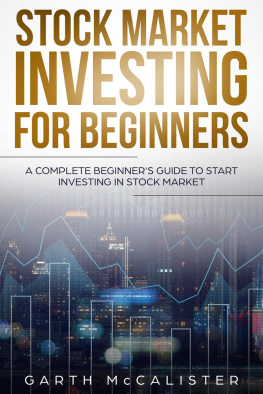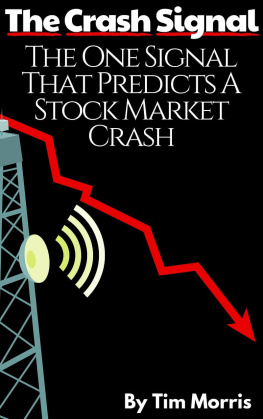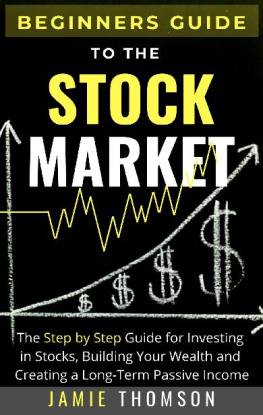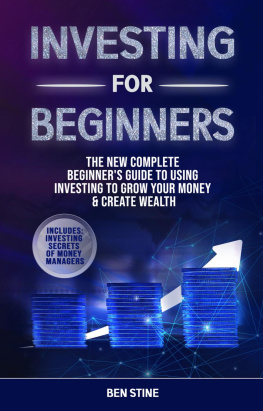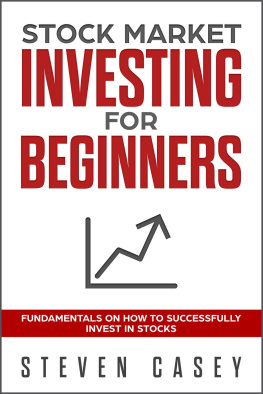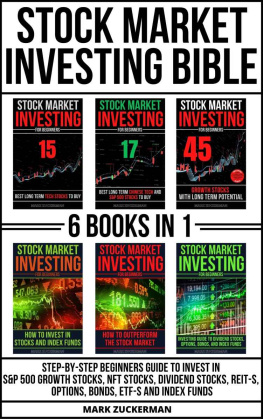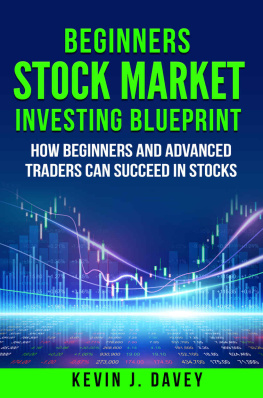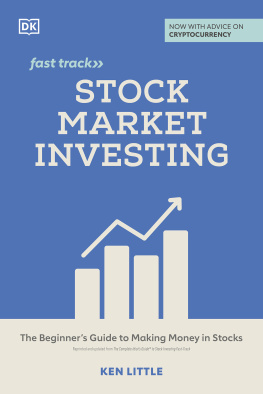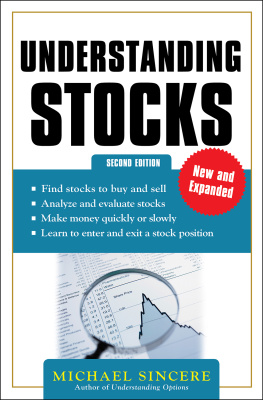STOCKS
This Is How You Should Invest
STOCKS
This Is How You Should Invest
The Beginners Guide to the Stock Market,
Value Investing, ETFs, and Asset Allocation
by
F i l i b o o k s F i n a n c e
Notice
This work is protected by copyright and may not be reproduced in any form without explicit written permission by both the author and the publisher of this book. The rights of translation and the creation of derived works are also fully protected by the author and the publisher of this book.
In no event shall Filibooks, its directors, its employees, and its agents be liable to any reader or third party for any damages of any kind arising out of the use of any content or other material found in this book, including, without limitation, any investment losses, lost profits, or lost opportunity.
No warranty is given nor implied with respect to the completeness and/or accuracy of this book. The information presented in this book is not intended to be, nor does it constitute, investment advice or recommendations.
Copyright 2020 by Filibooks ApS
All rights reserved
Published by Filibooks ApS, Denmark
First Edition, October 2020
More information is available at filibooks.com
You are also welcome to contact us at
Table of Contents
Chapter 1
Chapter 2
Chapter 3
Chapter 4
Chapter 5
Chapter 6
Chapter 7
Chapter 8
Chapter 9
Chapter 10
Chapter 11
Chapter 12
Chapter 13
Chapter 14
Chapter 15
Chapter 1
Introduction
You may have thought about investment as something thats only for rich people. In fact, investment ought to be for everybody. And fortunately, thanks to developments such as online brokers, tracker funds, and low-cost trading, investment is for everybodyeven if you are investing only a few hundred dollars.
I have a philosophical reason for saying that investment ought to be for everybody. If you invest in stocks, youre investing in the machinery of wealth creation. You are getting a stake in the things that make money.
Thats where owning stocks differs from just leaving your money in the bank. Youre investing in productive assets. Youre investing in businesses that make things and provide services. Youre investing in businesses that build offices and malls, cars and heavy machinery; in businesses that make films and TV series; in businesses that develop software or drugs. Youre buying into the engine of the economy, and you are helping to lubricate that engine and make it work efficiently.
Stocks are a chance to take part in someone elses success. If, for instance, you invest in a growth company in its early stages, youre supporting a business venture that can, over time, create thousands of jobs. And youre also creating a stock of value for yourselfwhether you choose to use that to create complementary income or a retirement pension, or to save for life goals like a house purchase or college education. Youre aligning your own success with the success of others. Its win-win.
Because you are a part owner of the business, its also a kind of economic democracy you are joiningand yes, you get a vote. Its not one man, one vote like democratic elections, as you vote your shares, getting one vote for each share that you own. But you do get to vote. If you care to use your votes to tell major corporations that they need to clean up their environmental act, you can do so. If you want to vote women onto the board, you can do so. Of course, if you simply want to build an income from dividends, you can do that too.
Thats why I think its important that as many people as possible become investors and participate to the full in the economy: it makes the economy more democratic. Almost all of us are investors, in fact, but often we dont participate directlywe may be investors by default in a pension scheme run by an employer, for instance. Once you start investing directly, you become aware of exactly where you are putting your money. Its a different level of responsibility.
Theres a lot to learn. But none of it is rocket science. Ive written this book to show you how to get started. Im going to cut out the jargon and give you plenty of real-world examples that show you investing strategies that workas well as describing the stock markets various traps and pitfalls so you can avoid them. Note that you can find a glossary of common terms and their definitions at the back of the book.
I believe everyone should learn how to invest. Even if you decide to hand over responsibility to someone else to manage your money because you want to spend your time doing something else, you need to be able to ask the right questions to make sure your money is being properly looked after.
Chapter 2
Your Unique Advantage
As a retail investor, you have some severe disadvantages compared with an investor working on Wall Street. For starters, you probably have a day job that takes up a good deal of your time, so your investing has to be done in your free time. And you may not have much free time at all once youve attended to family, friends, sports, shopping, and everything else that takes up your non-working hours. You probably also have less access to huge amounts of information than a stock market analyst does, and you almost certainly dont have the ability to pick up the phone and speak to CEOs and finance officers at companies whose shares interest you.
Nonetheless, there are several investing strategies that can work really well for you. And you also have important advantages over the Wall Street analyst.
You can choose exactly what you want to invest in and how you want to structure your portfolio. You dont have to concentrate on one asset class just because thats whats in your job title. An equities analyst, on the other hand, cant say: Hey, my clients would make much more money in real estate than they would buying stockseven if its true.
You can buy bonds, equities (i.e. shares/stocks), ETFs (which Ill talk about in a later chapter), mutual funds (which might invest in bonds, equities, or other assets), or a mix of all of them without asking anyones permission. You dont have to spend your time covering stocks you dont find interesting. And if you dont have the expertise to invest in an area like healthcare or technology or banking and insurance, you can pick a fund to do that for you, and you can concentrate your energies on stuff that you do know about.
Famed investor Peter Lynch (more on him later) believes that you also have another huge advantage over the professional Wall Street investor: You dont have to convince anyone else that youre making the right investment. You have no boss or investment committee to pacify if you want to make a contrarian call. You dont have to match a benchmark, and if you want to skew your portfolio towards emerging markets and smaller companies to get higher growth rates, you can feel free. If you find that all the good ideas at a given moment are in a single sector, you can just go ahead and buy them (though you should think about a little diversification just to be on the safe side). In short, unlike a professional Wall Street investor, you are free to invest exactly as you see fit.
You also dont have the problem of size. A big mutual fund worth billions of dollars isnt going to be interested in a small company with a market capitalization of just a few tens of millions because, however well that company does, it will never make an appreciable impact on the funds performance figures. That same company, however, could transform your investment portfolio all on its own.


